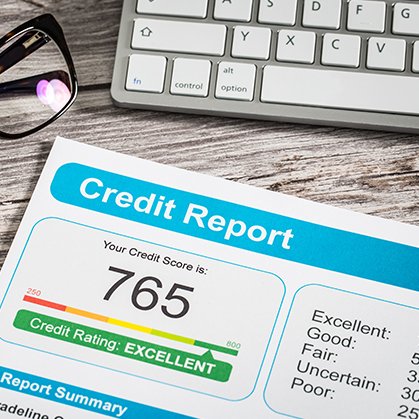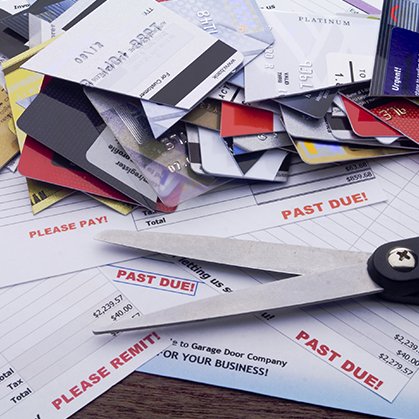Need Help?
Please feel free to contact us. We will get back to you promptly. Or just call us now.855-825-4525
[email protected]
What Is A Credit Score?
A credit score is a number generated by a mathematical formula that is meant to predict credit worthiness. The most common of the credit score standards is the FICO score created by Fair Isaac. The FICO score ranges from 300-850 and is intended as a predictor of whether or not you will be 90 days late on a loan obligation. Fair Isaac uses millions of credit reports to calibrate the FICO scoring model and is very secretive of the exact formula.
Here is a percentage breakdown of a FICO score:
35% – Payment History
30% – Debt Ratio
15% – Length of Credit History
10% – Types of Credit
10% – Number of Credit Inquiries
When you hire us, we will work on removing inaccurate, obsolete or unverifiable items from your payment history. We will also show you how to maximize your debt ratio score, even if paying off credit cards is not an option. Our Company even has methods of increasing your credit history with positive rated accounts that will improve your score. We can also work on removing credit inquiries from your credit report. Most people are aware of the three credit reporting agencies TransUnion, Equifax, and Experian. The average difference in scores between the highest and lowest of your three FICO scores is 60 points. This is the result of each of the credit bureaus having different items on their report, which may be correct, incorrect or are not reported in full compliance with credit law.
Building your credit profile is just as important as removing bad stuff from your credit report. In order to have an even higher credit score you need to establish good credit.
You need to have 3 credit cards reporting to your credit report, the link below will give you access to cards that are designed to help people with bad credit.
Step 1) Apply For Unsecured, Secured & Credit Builders
Step 2) Apply for 2 secured credit cards
Step 3) Monitor your credit thru www.sizzlecredit.com
Step 4) Once these cards appear on your credit report in 3-4 weeks &
Step 5) Once your scores are above 580
Step 6) Apply for 2 Unsecured Cards
According to the Government Accountability Office, 80-90% of credit reports have serious errors on them and this does not even include the more minute errors for which we look.
How can I find out my credit score?
Visit www.myfico.com and order the same credit score a mortgage company uses for approvals. Requests for one’s own FICO score at www.myfico.com is considered a personal inquiry and will not hurt the credit score. While www.myfico.com is good we use another company that is excellent, much cheaper and gives 3 scores and 3 reports every 30 days, click on the “establish credit” tab to pull your own report.
How can I get a free copy of my credit report?
By law, all consumers are entitled to a free copy of their credit report from each of the three credit bureaus once per year. Visit www.annualcreditreport.com to get your report for FREE. This is for the credit report only and does not include the credit score.
How long will the items be reported on my file?
Delinquencies (30-180 days): A delinquency may remain on file for seven years from the date of the initial missed payment.
Collection accounts: May remain seven years from the date of the initial missed payment that led to the collection (the original delinquency date). When a collection account is paid in full, it will be marked as a “paid collection” on the credit report.
Charged-off accounts: This will remain seven years from the date of the initial missed payment that led to the charge-off (the original delinquency date), even if payments are later made on the charged-off account.
Closed accounts: Closed accounts are no longer available for further use and may or may not have a zero balance. Closed accounts with delinquencies remain for seven years from the date they are reported closed, whether closed by the creditor or by the consumer. However, the delinquency notation will be removed seven years after the delinquency occurred when pertaining to late payments.
Positive closed accounts: Continue to be reported for ten years from the closing date.
Lost credit card: If there are no delinquencies, credit cards reported as lost will continue to be listed for two years from the date the creditor is contacted. Delinquent payments that occurred before the card was lost are reported for seven years.
Bankruptcy: Chapters 7, 11, and 12 will remain on one’s credit report for ten years from the filing date. A Chapter 13 bankruptcy is reported for seven years from the filing date. Accounts included in bankruptcy will remain for seven years from the date reported as included in the bankruptcy.
Judgments: Remain seven years from the date filed.
City, county, state, and federal tax liens: Unpaid tax liens remain indefinitely from the filing date. A paid tax lien will remain on one’s score for seven years from the date of payment.
Inquiries: Most inquiries listed on one’s credit report will remain for two years. All inquiries must remain for a minimum of one year from the date the inquiry was made. Some inquiries, such as employment or pre-approved offers of credit, will show only on a personal credit report pulled by you.
Is there anything that cannot be in my credit report: Certain information cannot be in a credit report, including: medical information (unless you provide consent), notice of bankruptcy (Chapter 11), more than ten years old debts (including delinquent child support payments), age, marital status, or race (if requested from a current or prospective employer).
Request A Free Consultation
Take The First Steps Towards Fixing Your Credit – Sign up for a FREE Credit Consultation











